Designs For A Multi Use Tool Bench
The Complete Guide to Screwdrivers
Our guide explains everything you need to know about screwdrivers and the different types available.

Reviewed by Luqman Said Abdullah, Technical Support Engineer (January 2021)
Screwdrivers are a type of hand tool used for the insertion and removal of screws. They are available in a multitude of variations to correspond to the correct screw drive.
The drive or head of a screw has a shaped cavity and protrusion that fits the screwdriver tip. A turning force known as torque can be applied in either a clockwise or counter-clockwise direction.
Screwdriver Uses and Applications
The screwdriver is one of the most essential hand tools in any tool kit. There are many situations and professions where a screwdriver is integral to carrying out a specific task revolving around loosening or tightening fasteners.
Some of the most common uses of screwdrivers include:
-
Electronics and electrical equipment
-
Opening mobile phones
-
Opening computers
-
Mechanical and industrial production
-
Woodworking and carpentry
-
Metalwork and fastening wood to metal
-
Flammable environments
It should also be noted that some specific types of screwdriver are best suited to certain applications. For instance, the best electrician's screwdrivers will be insulated to protect the user. Conversely, Phillips screwdriver uses are more varied as these tools are suitable for a range of general-purpose applications.
Types of Screwdrivers
The different types of screwdrivers are typically determined by the drive tip shape which corresponds with the specific head type of a given screw. However, other screwdriver types are application-specific or are intended for particular industries.
Some of the most common types of screwdrivers are detailed in the sections below.
Phillips Screwdriver
Also known as cross-head screwdrivers, Phillips screwdrivers are one of the most common types. But what is a Phillips head screwdriver? These tools are designed to fit screws with Phillips heads, which have a cross-shaped recess - hence the alternative name of cross screwdriver. They were invented to cope with higher torsion.

Torx or Star Screwdriver Known variously as star head screwdrivers, pointed screwdrivers, six-point screwdrivers, and torx screwdrivers, these versions are all the same type. Torx is the trademark for a type of screw head with a six-point star-shaped intrusion, hence the generic name star screwdriver. These exist to ensure even more torque can be applied, in mechanical production, for example.

Insulated Screwdrivers
Also known as safety screwdrivers, insulated screwdrivers are important for taking safety precautions in potentially hazardous scenarios. They are constructed from non-conductive materials such as rubber. VDE screwdrivers are also designed with safety in mind. VDE is an internationally-accredited institution that tests tools to certify that they meet the necessary safety standards. These tools are ideal for electricians.
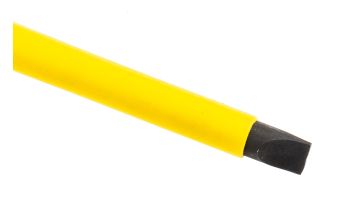
Torque Screwdrivers
Not to be confused with Torx, a screwdriver with torque is similar to a torque wrench. Both are used to apply a specified torque which is meant to be just enough but not too excessive. They are ideal for tightening screws sufficiently without breaking the material they are fastening and inversely tight enough so they do not fall out. A torquing screwdriver has a torque-limiting clutch that allows a limit on how much force is applied beyond a certain threshold.
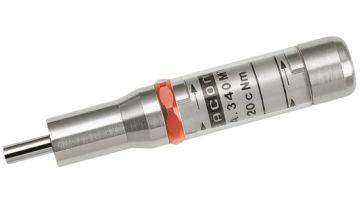
Flathead Screwdriver
The slot or flat-headed screwdriver is probably the most common form of hand tool. It has a flattened tip used for screws with a straight linear intrusion across the head. Flat blade screwdrivers are multi-purpose and can typically be used for a range of applications.

Tri-Wing Screwdriver
These are used for specific devices such as consoles, mobile phones and cameras. They often feature quite small tips to enable use with smaller screws and components.

Pozidriv Screwdriver
Pozidriv screwdrivers are essentially an upgraded version of Philips. They were designed to reduce cam-out, which is the process where a screwdriver slips out of the screw head when more torque is applied.

Hex Screwdriver
Allen keys or wrenches are more popular tools for loosening or tightening hex screws. However, hexagon screwdrivers exist to serve the same purpose and hex-head tools are often included in sets.

Square Screwdriver
The square-headed screwdriver fits screws with a square-shaped recess. It was invented to reduce the cam-out issue of the slotted screws and therefore speed up the fastening process.
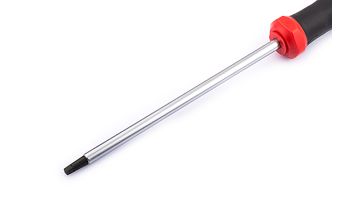
Electric Screwdrivers and Impact Drivers
Electric or cordless screwdrivers are generally compact power tools that are good for various tasks such as assembling furniture or screwing into softwood or other similar materials. Impact drivers, on the other hand, are essentially a more heavy-duty screwdriver type, intended for tasks like tightening or loosening fasteners using sudden force to drive into or remove from harder, denser materials.
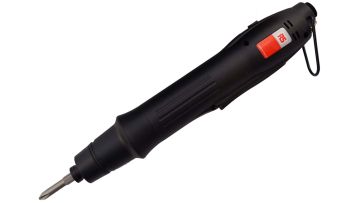
Precision Screwdrivers
These screwdrivers are used for very small devices where extremely small screws are used. An example of this would be precision work on watches and mobile phones.
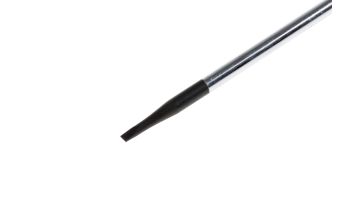
Other Screwdriver Types
Triangle Screwdriver
Tools featuring a triangle screwdriver head are less common, but they are ideal for certain applications. The triangular screwdriver head is beneficial as its design makes it more secure and tamper-proof than alternatives. These tools are often used with appliances, toys, and electronics.
Magnetic Screwdrivers
Screwdrivers with magnetic tips allow screws to be attracted by magnetic force. This reduces the risk of accidentally dropping them. Magnetised tools are useful for working on electronics where screws are small and can be easily dropped into hard-to-reach places.
Ratchet Screwdrivers
Ratcheting screwdrivers have a built-in mechanism that allows the application of force only in one direction while allowing free movement in the other direction. These hand tools function similarly to ratchet spanners.
Screwdriver Sizes
Screwdrivers come in many different sizes. As well as the standard large, medium and small, there are also stubby screwdrivers that are ideal for use in tight or confined spaces. The tip width and the length of both the blade and the overall tool are usually measured in millimetres (mm).
You should note that some sorts and brands may offer different sizing options to others. For instance, there are four standard Phillips screwdriver sizes. These range from #0 to #4, where #0 is the smallest screwdriver.
Some tools can also be classified by torx size. This is shown by the letter T followed by a number - for example, T10 screwdrivers. It ranges from miniature screwdrivers right up to T45 and beyond. This system can also be applied to screws, helping you choose the corresponding screwdriver for a particular sized screw.
Parts of a Screwdriver
The three main parts that constitute a screwdriver are as follows:
-
Handle
-
Shaft or shank
-
Drive tip or bit
All three parts are made in a production process using machines to form the correct shape of material using an extruder and heat-treating it to achieve the desired tensile strength.
Screwdriver Handle
Screwdriver handles are used for gripping and are generally shaped to prevent rolling on flat surfaces. They can also be ergonomically-designed to improve comfort when gripping. The materials used in the manufacturing process have changed over time and there is now also more variety for tools intended for use in specific applications. Most commonly, the handles are ergonomic and made of a composite of hard plastic such as cellulose acetate and rubber. They can also be covered in a non-slip, soft material like thermoplastic rubber to improve grip.

Shaft or Shank
The shaft or shank is commonly made of strong steel to ensure that bending or twisting deformation does not occur when applying force. The shaft will be rounded or hexagonal to allow a spanner or wrench to be used to apply increased torque. The shaft is generally different colouration and material to the drive tip which can be interchangeable.

Drive Tip or Bit
The drive tip can be an integrated part of the shank if it is not detachable. Alternatively, it can be an interchangeable part known as a driver - similar to drill bits. These are designed for use with multi-bit tools. The tip may also be known as the screwdriver head.

Screwdriver Brands
Sets of Screwdrivers
Screwdriver sets are highly useful when it comes to having a variety of pieces in one place. For example, there are precision screwdriver sets for delicate electronic work, as well as more multi-purpose electrician screwdriver sets for professionals.
Sets typically contain a variety of tools in a range of sizes. Depending on the set, this could include multiple different types or varying sized versions of the same tool. A popular example of this is torx screwdriver sets. The best set of screwdrivers will ultimately depend on your requirements so be sure to select the most suitable set for your task or industry.
FAQs
Can You Use a Magnetic Screwdriver on a Computer?
Yes - the magnet is generally not strong enough to cause damage to electrical components. However, you should be careful not to touch exposed circuitry near screw holes on a motherboard or hard drive.
What are the Best Screwdrivers?
High-quality, good screwdrivers are available from a range of leading brands and manufacturers. However, the best screwdrivers will largely depend on your specific needs. For example, an electrician will have different requirements from a hobbyist.
What Materials are Screwdriver Bits Made from?
Drive tips can be made from a variety of metals and alloys, including:
-
Titanium
-
Stainless steel
-
Tool grade steel or S2
-
High-speed steel or HSS
-
Chromium-vanadium-molybdenum or CVM tool steel
-
Other non-sparking metals to reduce combustion risk
Each has its own benefits and ideal applications.
Product Spotlight
Designs For A Multi Use Tool Bench
Source: https://uk.rs-online.com/web/generalDisplay.html?id=ideas-and-advice/screwdrivers-guide
Posted by: eppsuporly.blogspot.com

0 Response to "Designs For A Multi Use Tool Bench"
Post a Comment